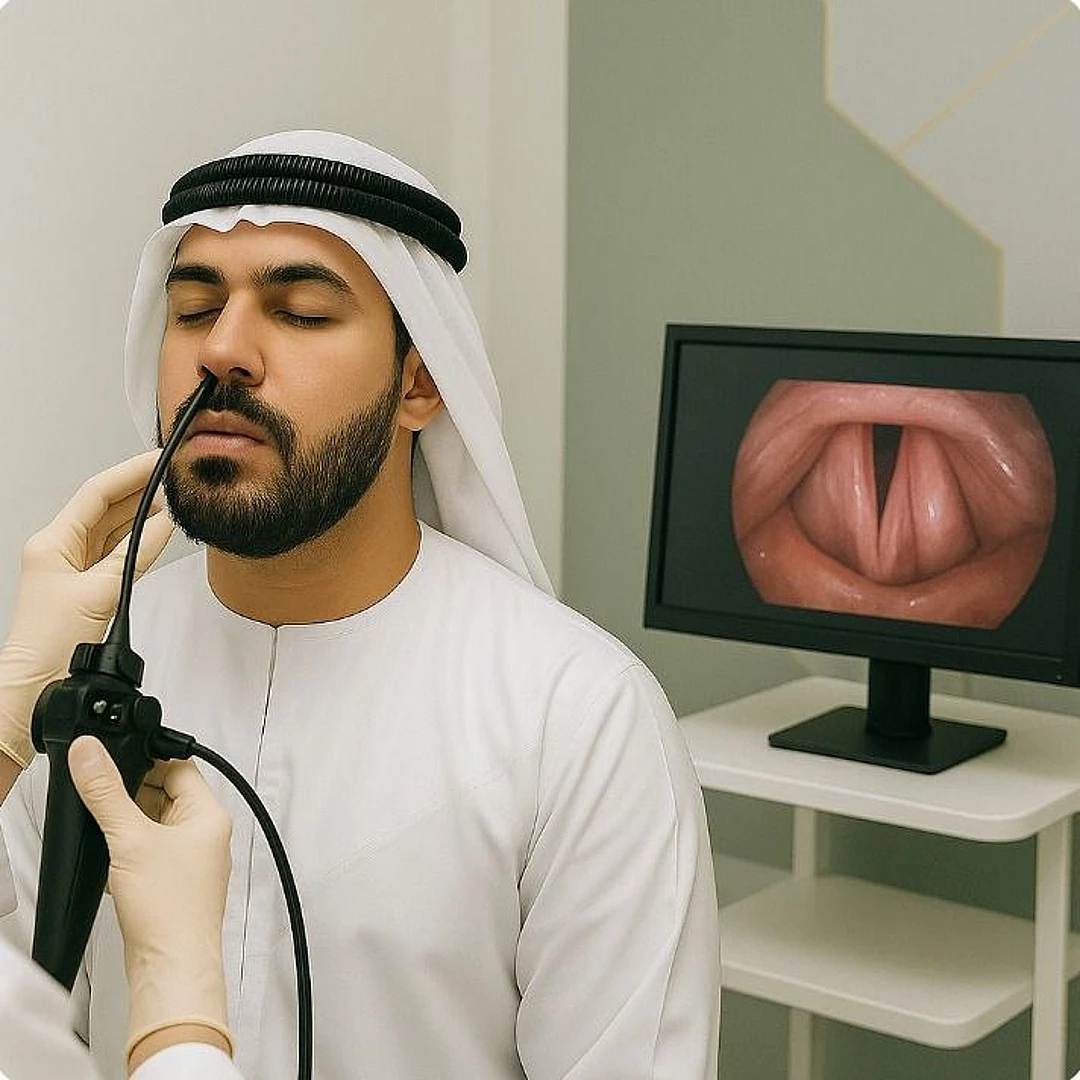Struggling with Hoarseness?
Hoarseness is a noticeable change in the tone or quality of your voice. It may sound rough, weak, or strained. While hoarseness is common and often temporary, it can sometimes indicate a more serious issue that requires professional evaluation.
Dr. Maryam provides comprehensive care starting with advanced diagnostic tools, followed by a personalized treatment plan based on the underlying cause, whether it’s functional, inflammatory, or neurological.
Our goal is to help you regain vocal clarity and confidence with solutions tailored to your lifestyle and communication needs.
Dr. Maryam Qaydi’s Expertise
Dr. Maryam Qaydi is one of the UAE’s leading ENT consultants with extensive expertise in voice disorders. She brings together international qualifications and clinical leadership to offer exceptional care.
 The first Emirati physician to obtain a specialized fellowship in voice and laryngeal disorders.
The first Emirati physician to obtain a specialized fellowship in voice and laryngeal disorders.
 Member of the Review Committee at the Accreditation Council for Graduate Medical Education–International (ACGME-I) since 2021.
Member of the Review Committee at the Accreditation Council for Graduate Medical Education–International (ACGME-I) since 2021.
 Certified Consultant in Otolaryngology–Head and Neck Surgery (SB-ORL).
Certified Consultant in Otolaryngology–Head and Neck Surgery (SB-ORL).
 Holder of the European Board in Otolaryngology.
Holder of the European Board in Otolaryngology.
 Specialist in treating hoarseness, vocal cord disorders, and sleep apnea.
Specialist in treating hoarseness, vocal cord disorders, and sleep apnea.
 Assistant Professor at the College of Medicine and Health Sciences, United Arab Emirates University.
Assistant Professor at the College of Medicine and Health Sciences, United Arab Emirates University.
 Former Program Director of the Otolaryngology Residency Program (2018–2023).
Former Program Director of the Otolaryngology Residency Program (2018–2023).
 Secretary of the UAE Board of Otolaryngology since 2020.
Secretary of the UAE Board of Otolaryngology since 2020.
 Member of national accreditation committees for health specialties.
Member of national accreditation committees for health specialties.
 Holder of a diploma in Body Language and a training program in Healthcare Systems Management.
Holder of a diploma in Body Language and a training program in Healthcare Systems Management.
Causes of Hoarseness
Hoarseness results from changes in the vocal cords or how they’re used. While often minor, some causes may require medical attention.
Common causes include:
 Vocal overuse or misuse (frequent in teachers, singers, and public speakers)
Vocal overuse or misuse (frequent in teachers, singers, and public speakers)
 Laryngitis (inflammation of the vocal cords)
Laryngitis (inflammation of the vocal cords)
 Acid reflux (laryngopharyngeal reflux)
Acid reflux (laryngopharyngeal reflux)
 Vocal cord nodules or polyps
Vocal cord nodules or polyps
 Vocal cord paralysis or spasms
Vocal cord paralysis or spasms
 Chronic allergies or dry air
Chronic allergies or dry air
 Neurological or psychogenic factors
Neurological or psychogenic factors
How Hoarseness Is Diagnosed
Accurate diagnosis is the foundation of effective voice treatment. At the clinic, we use advanced tools to determine the exact cause of your hoarseness.
These include:
 Detailed medical and vocal history
Detailed medical and vocal history
 Acoustic and perceptual voice analysis
Acoustic and perceptual voice analysis
 Laryngoscopy with high-definition video
Laryngoscopy with high-definition video
 Laryngeal electromyography (in selected cases)
Laryngeal electromyography (in selected cases)
 Imaging tests (MRI or CT) when required
Imaging tests (MRI or CT) when required
Available Treatments
Hoarseness is treatable in most cases. The treatment plan is not chosen by the patient but carefully determined by the doctor based on individual assessment and needs.
Medical solutions may include:
 Voice therapy sessions supervised by speech-language specialists
Voice therapy sessions supervised by speech-language specialists
 Medications to treat inflammation or acid reflux
Medications to treat inflammation or acid reflux
 Botox injections for vocal cord spasms
Botox injections for vocal cord spasms
 Minimally invasive surgery (laser or endoscopic) to remove nodules or benign growths
Minimally invasive surgery (laser or endoscopic) to remove nodules or benign growths
 Vocal hygiene education and lifestyle modifications
Vocal hygiene education and lifestyle modifications
Success Stories
Many patients treated for hoarseness under Dr. Maryam Qaydi’s care have reported noticeable improvements in voice quality and vocal strength. Through accurate diagnosis, customized care plans, and consistent follow-up, Dr. Qaydi helps patients return to speaking with confidence free of strain, pain, or hesitation.
FAQs
 How long does hoarseness usually last?
How long does hoarseness usually last?
 Typically, it resolves within a few days. If it lasts more than two weeks, you should consult a specialist.
Typically, it resolves within a few days. If it lasts more than two weeks, you should consult a specialist.
 Is hoarseness a sign of something serious?
Is hoarseness a sign of something serious?
 Not always. But in some cases, it can indicate underlying conditions that need medical evaluation.
Not always. But in some cases, it can indicate underlying conditions that need medical evaluation.
 Does treatment require surgery?
Does treatment require surgery?
 Most cases are treated without surgery, through voice therapy and medication. Surgery is only considered if growths or nodules are present.
Most cases are treated without surgery, through voice therapy and medication. Surgery is only considered if growths or nodules are present.
 Can hoarseness affect my quality of life?
Can hoarseness affect my quality of life?
 Yes—especially if your profession depends on vocal performance. It may affect confidence and productivity.
Yes—especially if your profession depends on vocal performance. It may affect confidence and productivity.
 Are there exercises that help improve my voice?
Are there exercises that help improve my voice?
 Yes. Specialized voice therapy exercises can improve vocal function and prevent strain.
Yes. Specialized voice therapy exercises can improve vocal function and prevent strain.
 What’s the difference between temporary and chronic hoarseness?
What’s the difference between temporary and chronic hoarseness?
 Temporary hoarseness usually resolves in days; chronic hoarseness lasts over two weeks and may require deeper evaluation.
Temporary hoarseness usually resolves in days; chronic hoarseness lasts over two weeks and may require deeper evaluation.
 Can reflux-related hoarseness be treated?
Can reflux-related hoarseness be treated?
 Absolutely. It can be managed through diet, medications, and behavioral changes under medical supervision.
Absolutely. It can be managed through diet, medications, and behavioral changes under medical supervision.





